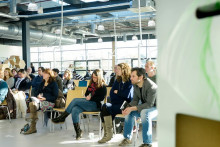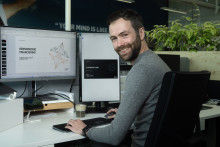Denman moderated a debate between professors, international students, industrial designers and a performance artist.‘ The question is why do we fear the government having all of our information but we don’t feel the same way if it’s Google who has it,’ said Angelika Mader, professor of Human Media Interaction. The question provoked mixed opinions. Some argued the government might value the citizens’ interests more than companies who work for profit, others were concerned about the centralization of information.
Chinese students shared their own opinions on the technology. They recognized that while it might look intrusive at the outset, the system could also provide a ground for a stronger and reliable sharing economy where citizens are all accountable to one another.
Lillian Sol Cueva, a PhD candidate from Mexico, noted that we should look critically at the technology, but we should also look beyond it to reflect how Western society has rated individuals throughout history. ‘We have been scoring people for centuries based on their skin colour, their gender, their ethnicity,’ said Cueva. Philosophy assistant professor Kevin Macnish followed up on her comment noting that ‘this is one of the good things about Denman’s project. It confronts us with something that looks entirely radical to us. But when we reflect on it, we find we are confronted with our own society.’







